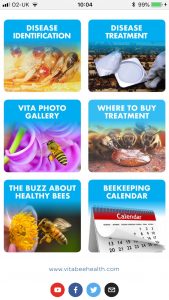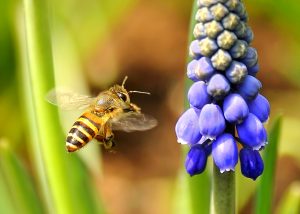Noticias
Vita International Photo Competition 2018
Entries are now being accepted for the seventh annual Vita Bee Health international photo competition.
One winner will receive a cash prize and eleven others will appear in the Vita 2019 limited edition calendar and feature in Vita’s monthly email newsletters. All winners receive a copy of the sought-after calendar.
The deadline for entries is 26 October 2018. Entrants may submit up to four photos (at least 1 MB in size) by emailing them to . Photos may be on any relevant topic relating to honeybees and beekeeping.
Honey bee health free smartphone app update
 The free Vita Bee Health honey bee health smartphone web app has just been updated and refreshed. Ideal for use in the apiary, the app helps beekeepers to quickly identify any health issues in their colonies.
The free Vita Bee Health honey bee health smartphone web app has just been updated and refreshed. Ideal for use in the apiary, the app helps beekeepers to quickly identify any health issues in their colonies.
The web app, suitable for nearly all smartphones and tablet devices, can be accessed free from www.healthybeeguide.com.
Detailed photographs show the visible symptoms of the main bee diseases and pests so that beekeepers concerned by what they see during a colony inspection can immediately check them on the app. Typical effects of the varroa mite, European and American foulbrood (EFB and EFB), Nosema, chalkbrood, wax moth, tracheal mites and viruses can be viewed within a few clicks. Keys to the identification of the Asian hornet and small hive beetle are also included.
Amongst the many app features, beekeepers can read about the treatment options, where to obtain treatments, and if and to whom they should report serious diseases and pests.
Vita’s new regulatory and quality manager
 Amarinder Singh has been appointed regulatory and quality manager at Vita Bee Health. He will help guide Vita’s products through the regulatory process to ensure that professional and hobbyist beekeepers will have the highest quality, safe and effective treatments for their honeybees.
Amarinder Singh has been appointed regulatory and quality manager at Vita Bee Health. He will help guide Vita’s products through the regulatory process to ensure that professional and hobbyist beekeepers will have the highest quality, safe and effective treatments for their honeybees.
After graduating with a Masters degree in biotechnology from the University of Hertfordshire (2007), Amarinder worked for The Medicines and Healthcare products Regulatory Agency (MHRA), then the Veterinary Medicines Directorate (VMD) as a pharmaceutical assessor in the quality team, work which included establishing guidelines for applicants and assessors, and most recently for Benchmark Animal Health. He has experience in working internationally and with a wide range of health products for animals.
Vita Photo Competition Winners 2017
An international panel has selected the bees and beekeeping photographs for the 2018 Vita Calendar and voted for Leka Huie from Hong Kong as the overall winner for his colourful action photo of a honey bee in-flight approaching a flower.
Entries will appear in the limited edition 2018 Vita Calendar distributed to Vita’s global network and the competition winners. Some of the photos are below and a pdf file of the full calendar is available for free download to users of the Vita Gallery www.vita-europe.com/beehealth/gallery.
The 2018 Vita Calendar monthly line-up of winning photographs is:
ApiShield defence against the Asian hornet
Following a sighting of an Asian hornet and the discovery of a nest in Devon, England, this week, British beekeepers are being urged to be on the alert for the invasive and destructive insect. ApiShield, an easily fitted and low-maintenance trap from Vita Bee Health, not only protects honey bee colonies from Asian hornet attack, but it also acts as an early warning of the Asian hornet’s arrival in an area.
The Asian hornet is native to China but arrived in a pottery consignment in Bordeaux, France in 2004. Since then the Asian hornets have spread at about 75 km per year across Europe, killing off many honey bee colonies and other native insect pollinators which have no defences to cope with the new predator.
ApiShield, Vita’s patented Asian hornet trap, has been rigorously tested in France and Greece and fools hornets and wasps attacking honey bee colonies into using unguarded underfloor ‘entrances’ not used by the colony’s honey bees. Beekeepers simply inspect the trapped dead and dying predators and look particularly for the Asian hornet.



